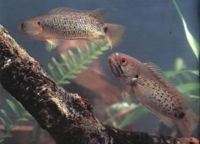Climbing Perch (Anabas testudineus)
From The Aquarium Wiki
Climbing Perch
Anabas testudineus
208 Litres (55 US G.)
16-25 cm (6.3-9.8")
6.0 - 8.5
22 -30 °C (71.6-86°F)
5-18 °d
1:2 M:F
5-8 years
Family
Anabantidae
Contents
Additional names
- Climbing Perch
Additional scientific names
- Amphiprion testudineus
Origin
|
|
This section requires expansion with: Location where this animal is found in the wild. |
Sexing
- There are no obvious differences between male and female.
Tank compatibility
- Do not keep with small fish as the Climbing Perch is a predator. Can be kept with others of its own kind.
Diet
- Will accept most foods including pellet and flake as well as live/frozen meaty foods such as bloodworm and daphnia.
Feeding regime
- Feed once or twice a day.
Environment Specifics
- Must have a spacious tank with plenty of hiding places in secure bogwood and rocks. A secure lid is a must with about 5.1-10.2cm (2-4") gap between the water surface and the top of the tank to avoid any mishaps if this fish jumps. This fish must have excellent filtration as it can be a messy eater, and hardy plants as it will nibble soft delicate plants.
Behaviour
- An aggressive yet shy fish that is not suitable for a general community aquarium. They are also know to jump when going to the surface for air.
Identification
- A slender fish with large scales and spines on the gill cover.It is grey-brown to silver in colour, with a dark spot on the base of the caudal fin. Some red can also be observed in the fins.
Species Notes
- Be very careful when handling this fish as the spines on its gill cover can cause it to get caught in nets, they will also use these spines to defend themselves.
- If this fish does escape, do not limit your search to the vicinity of the tank, this fish can "walk" and can be found a surprisingly long distance away! It uses this ability in the wild when pools start to dry up and it will move over land to find a new pool.
Pictures
External links
- Fishbase (Mirrors:
 )
)
